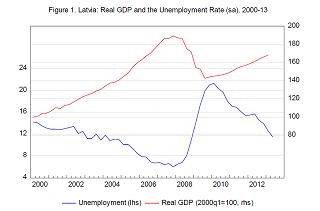Delors, J., Vitorino, A. and Bertoncini, Y., (2013), “Germany and the EU: a new cycle?”, EurActiv, 30 Σεπτεμβρίου. A new coalition in Germany may revamp its EU policy towards more commitment. The country’s partners will have to get a better grasp of its concerns, but the new constellation can foster further progress in Europe, write Jacques Delors, Antonio Vitorino and Yves Bertoncini. Jacques Delors is founding president, Antonio Vitorino is …Read More
Tax-policy procyclicality
Vegh, C. and Vuletin, G., (2013), “Tax-policy procyclicality”, VoxEU, 01 Οκτωβρίου. Government spending is procyclical in developing countries, exacerbating the business cycle. However, an analysis of tax policy is also required in order to properly assess the overall stance of fiscal policy. This column presents recent research showing that tax policy tends to be procyclical in developing countries and acyclical in developed countries. Although some developing countries have managed to …Read More
The Eurozone’s Calm before the Storm
Roubini, N., (2013), “The Eurozone’s Calm before the Storm”, Project Syndicate, 30 Σεπτεμβρίου. A little more than a year ago, in the summer of 2012, the eurozone, faced with growing fears of a Greek exit and unsustainably high borrowing costs for Italy and Spain, appeared to be on the brink of collapse. Today, the risk that the monetary union could disintegrate has diminished significantly – but the factors that fueled …Read More
Tax incidence in the presence of tax evasion
Kopczuk, W., Marion, J., Muehlegger, E. and Slemrod, J., (2013), “Tax incidence in the presence of tax evasion”, VoxEU, 30 Σεπτεμβρίου. Tax evasion and noncompliance reduces government revenue and exacerbates the problem of increasing debt. Standard economic theory predicts that the identity of the tax remitter shouldn’t affect outcomes – but this ignores the possibility of evasion. This column provides evidence that in the presence of evasion, both the amount …Read More
Η μεθυσμένη Ευρώπη
Καλλίτσης, Κ., (2013), “Η μεθυσμένη Ευρώπη”, Η Καθημερινή, 29 Σεπτεμβρίου. Το σχέδιο για το ευρώ ήταν παράγωγο ενός Μεγάλου Σχεδίου για μια Ενωμένη Ευρώπη ειρήνης, ευημερίας και αλληλεγγύης. Το Μεγάλο Σχέδιο είχε τρεις στόχους: (α) Να αποτραπεί ένας νέος ευρωπαϊκός διχασμός -μετά την εμπειρία της φρίκης δύο μεγάλων πολέμων που άφησαν συντρίμμια και περίπου 50 εκατομμύρια νεκρούς. (β) Να ενισχυθεί η δημοκρατία -μετά την εμπειρία, στον μεσοπόλεμο, της Κρίσης που …Read More
The work of J.S. Mill shows the danger in eliminating the differences between European nations
Glendinning, S., (2013), “The work of J.S. Mill shows the danger in eliminating the differences between European nations”, European Politics and Policy Blog, 30 Σεπτεμβρίου. Simon Glendinning writes on the English philosopher John Stuart Mill’s views on Europe. He notes that Mill saw Britain as being very much a part of Europe, but that he also recognised important differences between European nations. Far from seeing these differences as a weakness, …Read More
Germany as Currency Manipulator
Krugman, P., (2013), “Germany as Currency Manipulator”, The New York Times, The Conscience of a Liberal Blog, 27 Σεπτεμβρίου. […] The general point is that if we imagine a euro breakup, I think everyone would agree that the new mark would soar in value, making German manufacturing much less competitive. The German public imagines that it is being cruelly exploited for the benefit of lazy southerners; arguably, what’s really happening …Read More
As good as it gets in Latvia?
Hugh, E., (2013), “As good as it gets in Latvia?”, Fistfulofeuros Blog, 29 Σεπτεμβρίου. “This raises a final question, which, while not central to the issues of this paper, is nevertheless intriguing: How can a country with a low minimum wage, weak unions, limited unemployment insurance and employment protection, have such a high natural rate [of unemployment]?” “To summarize, the actual unemployment rate is still probably higher than, but close …Read More
Notes on Internal Devaluation
Lizoain, D., (2013), “Notes on Internal Devaluation”, Social Europe Journal, 27 Σεπτεμβρίου. The Spanish government’s formula for exiting the crisis is called an internal devaluation. This is a euphemism. They are attempting a generalized reduction in wages that requires a weakening of collective bargaining. For this reason, it is worthwhile to explore the concept of internal devaluation in more detail. The theory and the historical evidence is profoundly weak. In …Read More
Νέο «mea culpa» από το ΔΝΤ για την πολιτική της σκληρής λιτότητας
Χρυσολωράς, Ν., (2013), “Νέο «mea culpa» από το ΔΝΤ για την πολιτική της σκληρής λιτότητας”, Η Καθημερινή, 27 Σεπτεμβρίου. Νέα έκθεση του Διεθνούς Νομισματικού Ταμείου, η οποία δημοσιεύθηκε χθες, αμφισβητεί εμμέσως την πολιτική που εφαρμόστηκε στη Νότια Ευρώπη –και ειδικά στην Ελλάδα– κατά τη διάρκεια της κρίσης. Η μελέτη, η οποία εξετάζει τις επιτυχείς περιπτώσεις μείωσης του δημοσίου χρέους σε ανεπτυγμένες οικονομίες, τα τελευταία 30 χρόνια, καταλήγει στο συμπέρασμα ότι …Read More





